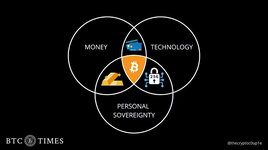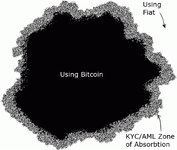Me: "Gee, maybe there are novel uses for new tools that people haven't thought of yet"No, this is fundamentally flawed. The concept of "blockchain" as useful for anything, except bitcoin.
Aside from the fact that a blockchain with no monetary use has no security incentive...
People do not "gain property rights" with titles on a blockchain, any more than they had before. The people with guns determine who has property rights. The use of or threat of force determines who owns what...if you can't defend it, you don't really own it. Blockchain does not change the logic of violence except in the case of bitcoin. The rules are enforced by bitcoin itself, self contained and unstoppable. No courts, lawyers, or police required. No amount of courts, police, or guns, affect the ownership of bitcoin...that is the difference.
Do you think the white South African farmers would have saved their property from confiscation, if only it were on a blockchain!?
Bitcoin is not a company. There is no CEO, no HQ, no P&L...its a protocol. It's email. Maybe something better than email will come along, so you should switch to wizbang-mail and start using that...except that excludes you from millions of other users. You can't communicate with anyone using the wizbang-mail protocol. You can't just replace something already built, with an established network. The incentives prevent it. Bitcoin is a Schelling point.
chance vought: "That's the dumbest fucking idea I've ever heard of"







